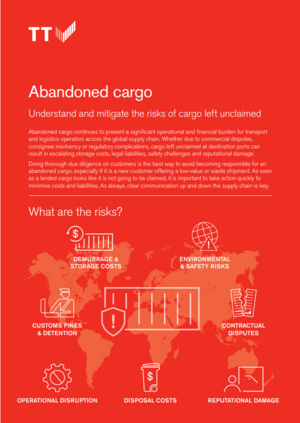TT brief: abandoned cargo
Abandoned cargo represents a critical challenge for transport and logistics operators worldwide, creating substantial operational and financial burdens across the global supply chain. When cargo remains unclaimed at destination ports due to commercial disputes, consignee insolvency, or regulatory complications, operators face escalating storage costs, legal liabilities, safety challenges, and reputational damage.
Effective risk management begins with thorough customer due diligence, particularly for new clients proposing low-value or waste shipments. Transport & logistics operators cover provides essential protection, but prevention remains the most effective strategy.
Identifying high-risk shipments
Several red flags indicate potential abandonment scenarios. These include bookings from unfamiliar customers shipping waste products, shipments to countries with known import restrictions, cargoes marked "shipped to the order of...", missed collection events, and cargo approaching the end of free storage periods. Low-value items such as waste, scrap, and recycling materials pose particular risks, whilst high-value or perishable goods require close monitoring due to their time-sensitive nature.
Comprehensive customer vetting involves verifying shipper and consignee identities, confirming their financial resources, and cross-checking information validity. Operators should confirm the authority of communication contacts and remain vigilant against unexpected approaches from unknown service providers. For high-risk situations, requesting security deposits or letters of indemnity provides additional protection.
Clear communication protocols prove essential throughout the shipping process. Contract terms must explicitly define all parties' responsibilities, specify collection timeframes, and outline non-compliance consequences. Cargo handling facilities cover supports operators managing these challenges at ports and terminals.
When cargo remains unclaimed, swift action minimises costs and liabilities. Operators should immediately notify liability insurers and relevant authorities, seek alternative storage solutions to reduce demurrage costs, and engage legal counsel for disposal procedures. Claims management & digital services provide crucial support during these complex situations.
Key Takeaways
- Thorough customer due diligence prevents most abandonment scenarios, especially with new clients and waste shipments
- Clear contractual terms and proactive communication reduce abandonment risks significantly
- Swift action when cargo appears unclaimed minimises escalating costs and legal complications
- Regular monitoring of high-risk shipments enables early intervention and problem resolution
Frequently Asked Questions
What are the main warning signs of potential cargo abandonment?
Key red flags include new customers shipping waste products, shipments to restricted import countries, cargo marked "shipped to the order of...", and missed collection deadlines after arrival.
How long should operators wait before taking action on unclaimed cargo?
Operators should issue formal collection demands immediately when delays occur, repeat within 45 days, and send final disposal warnings within 90 days whilst following local regulations.
What legal protections exist for transport operators facing abandoned cargo?
Comprehensive insurance coverage, proper contractual terms, documented communication, and professional legal counsel provide essential protection against abandonment-related liabilities and costs.
Documents
TT_Brief_Abandoned_cargo.pdf (861 kB) 17/07/2025
- Date
- 16/07/2025






